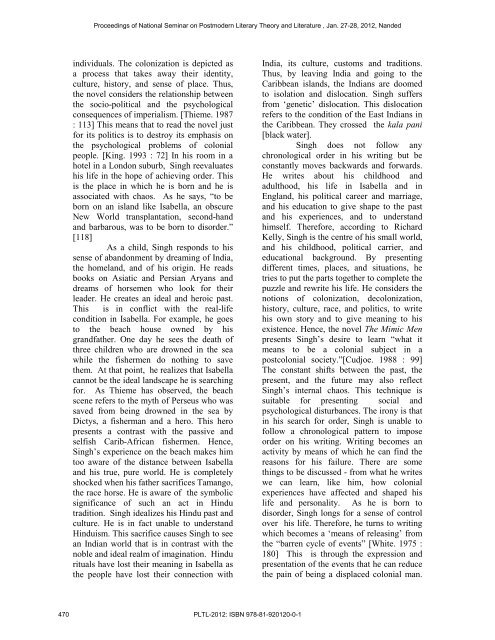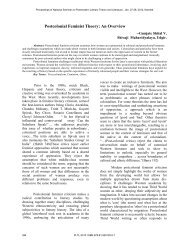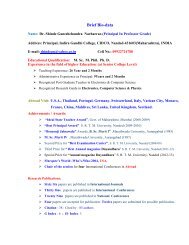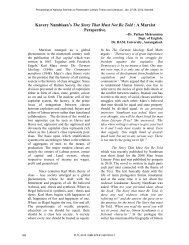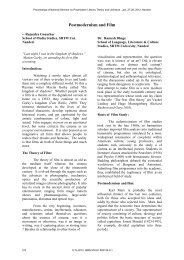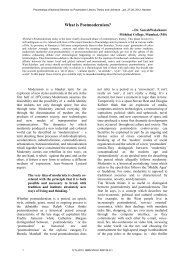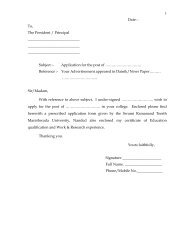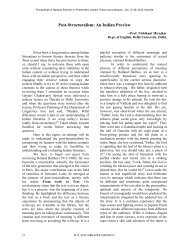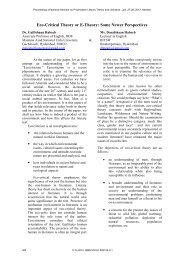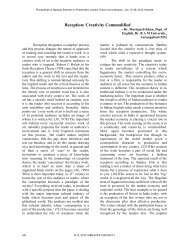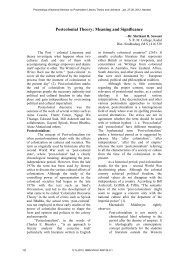Multiculturalism - Igcollege.org
Multiculturalism - Igcollege.org
Multiculturalism - Igcollege.org
Create successful ePaper yourself
Turn your PDF publications into a flip-book with our unique Google optimized e-Paper software.
Proceedings of National Seminar on Postmodern Literary Theory and Literature , Jan. 27-28, 2012, Nandedindividuals. The colonization is depicted asa process that takes away their identity,culture, history, and sense of place. Thus,the novel considers the relationship betweenthe socio-political and the psychologicalconsequences of imperialism. [Thieme. 1987: 113] This means that to read the novel justfor its politics is to destroy its emphasis onthe psychological problems of colonialpeople. [King. 1993 : 72] In his room in ahotel in a London suburb, Singh reevaluateshis life in the hope of achieving order. Thisis the place in which he is born and he isassociated with chaos. As he says, “to beborn on an island like Isabella, an obscureNew World transplantation, second-handand barbarous, was to be born to disorder.”[118]As a child, Singh responds to hissense of abandonment by dreaming of India,the homeland, and of his origin. He readsbooks on Asiatic and Persian Aryans anddreams of horsemen who look for theirleader. He creates an ideal and heroic past.This is in conflict with the real-lifecondition in Isabella. For example, he goesto the beach house owned by hisgrandfather. One day he sees the death ofthree children who are drowned in the seawhile the fishermen do nothing to savethem. At that point, he realizes that Isabellacannot be the ideal landscape he is searchingfor. As Thieme has observed, the beachscene refers to the myth of Perseus who wassaved from being drowned in the sea byDictys, a fisherman and a hero. This heropresents a contrast with the passive andselfish Carib-African fishermen. Hence,Singh’s experience on the beach makes himtoo aware of the distance between Isabellaand his true, pure world. He is completelyshocked when his father sacrifices Tamango,the race horse. He is aware of the symbolicsignificance of such an act in Hindutradition. Singh idealizes his Hindu past andculture. He is in fact unable to understandHinduism. This sacrifice causes Singh to seean Indian world that is in contrast with thenoble and ideal realm of imagination. Hindurituals have lost their meaning in Isabella asthe people have lost their connection withIndia, its culture, customs and traditions.Thus, by leaving India and going to theCaribbean islands, the Indians are doomedto isolation and dislocation. Singh suffersfrom ‘genetic’ dislocation. This dislocationrefers to the condition of the East Indians inthe Caribbean. They crossed the kala pani[black water].Singh does not follow anychronological order in his writing but beconstantly moves backwards and forwards.He writes about his childhood andadulthood, his life in Isabella and inEngland, his political career and marriage,and his education to give shape to the pastand his experiences, and to understandhimself. Therefore, according to RichardKelly, Singh is the centre of his small world,and his childhood, political carrier, andeducational background. By presentingdifferent times, places, and situations, hetries to put the parts together to complete thepuzzle and rewrite his life. He considers thenotions of colonization, decolonization,history, culture, race, and politics, to writehis own story and to give meaning to hisexistence. Hence, the novel The Mimic Menpresents Singh’s desire to learn “what itmeans to be a colonial subject in apostcolonial society.”[Cudjoe. 1988 : 99]The constant shifts between the past, thepresent, and the future may also reflectSingh’s internal chaos. This technique issuitable for presenting social andpsychological disturbances. The irony is thatin his search for order, Singh is unable tofollow a chronological pattern to imposeorder on his writing. Writing becomes anactivity by means of which he can find thereasons for his failure. There are somethings to be discussed - from what he writeswe can learn, like him, how colonialexperiences have affected and shaped hislife and personality. As he is born todisorder, Singh longs for a sense of controlover his life. Therefore, he turns to writingwhich becomes a ‘means of releasing’ fromthe “barren cycle of events” [White. 1975 :180] This is through the expression andpresentation of the events that he can reducethe pain of being a displaced colonial man.470 PLTL-2012: ISBN 978-81-920120-0-1


